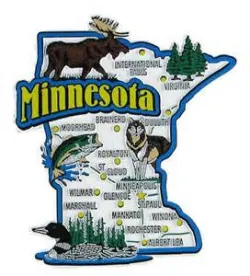On July 20, the Minnesota Legislature adjourned its second special session of the summer. While there was no prior agreement between Governor Walz (DFL) and legislative leaders before this special session was called, the hope and expectation was that the Legislature would pass capital investment, tax, supplemental budget, and police reform bills. After a week of negotiation, however, only police reform legislation was agreed to and passed before the Legislature adjourned. An impasse between Governor Walz and House Minority Leader Kurt Daudt (R – Crown) over the former’s use of executive authority to deal with the coronavirus pandemic prevented agreement on a capital investment bill, the primary order of business for the Legislature during the 2020 session and a bill needing a three-fifths supermajority to pass.
Governor Walz’ has previously stated that he plans to call the Legislature back into special session every 30 days during the pendency of the peacetime emergency, the declaration authorizing him to take any action to deal with the impacts of coronavirus. This means the Legislature will likely be back in August, September, October and possibly later — until the Governor decides that a peacetime emergency is no longer needed. Although capital investment and other bills could pass in future special sessions, Senate Majority Leader Paul Gazelka (R – Nisswa) and House Speaker Melissa Hortman (DFL – Brooklyn Park) have both expressed concerns that the politics of the upcoming election will make action more difficult the closer they get to November.
Police Reform
The House, Senate, and Governor agreed to a compromise package on police reform after two months of intense negotiations. This legislation is more comprehensive than those passed by other states in the wake of George Floyd’s killing. For example, New York passed three bills/reforms in their response. The Minnesota package enacts 13 separate reforms into law.
House and Senate negotiators have moved significantly since early June when the House had a very broad package of reforms and the Senate had a very limited proposal. While the tragedy of George Floyd sparked the action for reform, many of the reform proposals have been debated in Minnesota for nearly five years. In the last year, a working group of various stakeholders, led by Attorney General Keith Ellison and Governor Walz’s Commissioner of Public Safety John Harrington, held meetings across the state to propose how to reform public safety in Minnesota. The group came out with 23 proposals which were supported by a broad coalition of groups, including social justice advocates and members of the business community.
The legislation passed by the Legislature includes the following reforms:
- Enhanced training for law enforcement officers in crisis intervention, implicit bias, cultural diversity, and mental illness.
- Helping police officers deal with stress and trauma after critical incidents.
- Mandatory real-time reporting of deadly force incidents to the BCA.
- Banning chokeholds and neck restraints.
- Requiring a duty to intervene and report for officers on the scene of an excessive force incident.
- Instructing officers to preserve the sanctity of life and use non-deadly force whenever possible. This is a major change of how officers use deadly force and the standards by which they will be held to in a court of law.
- Adding two new community members to the POST Board, appointed by the Governor. This will increase the community members from two to four.
- The creation of a new 15- member committee that reports to the POST Board on police-community relations and the process of how agencies handle misconduct complaints.
- Adding four hours of mandatory autism training to the current 48 hours for each peace officer required every licensing cycle.
- Changing the binding arbitration statutes regarding discipline for police unions. Current arbitration practice has been scrutinized by many, including Chiefs of Police.
- The reform will eliminate labor and management’s ability to strike an arbitrator from overseeing a case. This is an effort to ensure that police officers that violate policy and are fired are not reinstated. This issue was one that was of great debate and negotiation. Other public unions weighed in behind the scenes in fear that anything beyond this approach would encroach on their collective bargaining agreements.
- Prohibit the use of “Warrior Training” for licensed peace officers in Minnesota.
- Police Residency Reform. “A statutory or home rule charter city or county may offer incentives to encourage a person hired as a peace officer on or after August 1, 2020, be a resident of the city or county.” This is aimed to help police forces be more representative of the communities they are sworn to protect.
- Independent investigatory unit in Bureau of Criminal Apprehension that will investigate use of force cases.
POST Board reform and changes to the arbitration process were the most contentious issues to reach agreement on during negotiations.
Governor Walz signed the legislation into law on Thursday.
Bonding
The Legislature failed, again, to come up with the necessary number of votes for a $1.35 billion capital investment bill. This comes after months of negotiations on what the Legislature traditionally considers its primary focus during the second year of the biennium. Under Minnesota’s Constitution both the capital investment bill and tax bill must first be passed in the House before it moves to the Senate. House Leadership decided to tie the two bills together in an effort to win over the necessary six votes — the capital investment bill needs a three- fifths supermajority vote to pass — from House Republicans. This did not work, and the bill failed to get the super majority of votes to pass. The sticking point continues to be the Governor’s executive authority to deal with coronavirus: the House minority wants the Governor to terminate his peacetime emergency declaration and authority to deal with coronavirus, which the Governor refuses to do.
It becomes more difficult to pass the bill during the August special session, as the Minnesota Department of Management and Budget (MMB) Commissioner Myron Frans has said the next available time to make changes to the budget is in September because of planned bond sales in August.
Statewide Mask Mandate
On July 22, Governor Walz, in an effort to slow the spread and prevent a second surge of COVID-19, announced that a mask mandate will go into effect on Saturday, July 25. This announcement came on the same day that Indiana Governor Eric Holcomb (R) and Ohio Governor Mike DeWine (R) made similar announcements requiring masks in their states. Minnesota will join approximately 30 states with a mask mandate.
Emergency Order 20-81 requires the following:
- Masking will be mandated in all public-facing indoor places in similar outdoor settings where social distancing is not possible.
- Signage at retail will be required. The state will produce sample signs.
- Businesses will be required to make a reasonable effort to educate non-compliant customers and will be required to deal with non-compliant customers in a manner similar to how they deal with any other non-compliant customers relative to store policy. Nothing in the Order requires businesses to enforce the requirement when it is unsafe to do so.
- Individuals that willfully violate the Executive Order is guilty of a petty misdemeanor and upon conviction must be punished by a fine not to exceed $100.
- Businesses that blatantly disregard the order will be subject to penalties.
- Exceptions will be made for health reasons or in cases of strenuous work.
- Local orders that exceed the state order will not be preempted.
Looking forward
The Legislature will likely be back on August 13 to again vote on the Governor’s peacetime emergency authority and pass any legislation that can be agreed to. This falls after the August 11 primary election.








 />i
/>i
